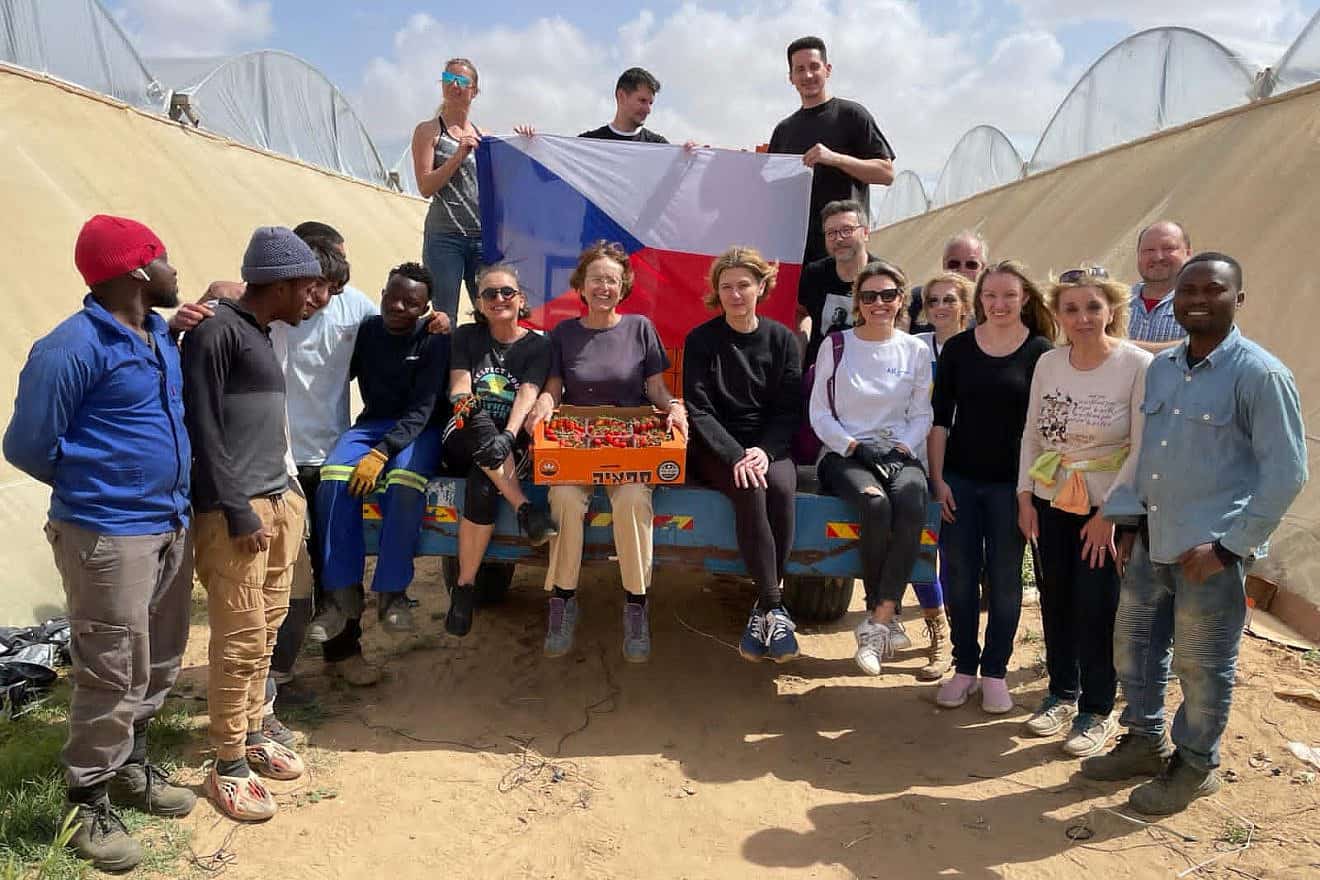“The inability to differentiate between the attacker and the defender is absolutely stunning,” Ambassador Veronika Kuchynova Smigolova tells JNS.
By Etgar Lefkovits, JNS 21 March 2024
 Czech Ambassador Veronika Kuchynova Smigolova (center) takes a break from picking zucchinis and cherry tomatoes at Moshav Mivtahim near the southern Gaza Strip, March 29, 2024. Photo: Courtesy of the Embassy of the Czech Republic.
Czech Ambassador Veronika Kuchynova Smigolova (center) takes a break from picking zucchinis and cherry tomatoes at Moshav Mivtahim near the southern Gaza Strip, March 29, 2024. Photo: Courtesy of the Embassy of the Czech Republic.
The outburst of antisemitism across the West following the Hamas massacre on Oct. 7 and the world’s inability to clearly differentiate between the attacker and the victim indicates that the lessons of the Holocaust have not been learned, the Czech ambassador to Israel said on Wednesday.
“I was very surprised how soon after October 7 this eruption of antisemitism came even before the Israeli military operation in Gaza began,” Ambassador Veronika Kuchynova Smigolova told JNS in an interview. “I had thought that classic antisemitism was much weaker than it is.”
The envoy from one of Israel’s staunchest allies in Europe said she remains dumbfounded by the world’s reaction to the invasion that triggered the five-month-old war against Hamas in Gaza, which quickly focused on the plight of Palestinians in the Strip.
“It looks like the lessons from the Holocaust were not learned properly,” Kuchynova Smigolova said. “This inability to differentiate between the attacker and the defender is absolutely stunning.”
The ambassador said that she was particularly shocked by how under-reported the sexual crimes of Hamas were, and the international community’s belated and minimalistic response to the attacks, including women’s groups and the United Nations.
“It looks like nobody wanted to see that,” she said.
Kuchynova Smigolova, who previously served as deputy foreign minister, said that a largely uninformed and uninterested European public was being influenced by a strong anti-Israel slant in the media, several major anti-Israeli countries in Europe, senior E.U. leaders and the ignorant voices of uneducated youth at universities.
“I hope that what happened after October 7 with the denial [of the massacre] and the antisemitism will be a wake-up call for many governments in the West to start with education, not only about the Holocaust and antisemitism but about the creation of the State of Israel and the indigenous connection of the Jewish people,” she said.
“It is clear to me that Hamas cannot remain in power,” Kuchynova Smigolova said. “October 7 was such a clear unprovoked attack on civilians in Israeli territory that was not even in dispute on people from the left who supported peace and employed Gazans and yet it happened to them.”
 Czech Ambassador Veronika Kuchynova Smigolova harvests zucchinis at Moshav Mivtahim, March 29, 2024. Photo: Courtesy of the Embassy of the Czech Republic.
Czech Ambassador Veronika Kuchynova Smigolova harvests zucchinis at Moshav Mivtahim, March 29, 2024. Photo: Courtesy of the Embassy of the Czech Republic.
Differences within the EU
In the interview, the ambassador was highly critical of E.U. foreign policy chief Josep Borell for his vociferous criticism of Israel, including his comments that Jerusalem was intentionally starving Palestinians in Gaza. She stressed, however, that many of his remarks represented his personal views and not those of the 27-member E.U.
“We are very unhappy with some of his statements,” Kuchynova Smigolova offered diplomatically, noting Borell is in the last weeks of his term with E.U. elections set for May.
“Almost anybody would be better than him,” she said.
Despite its support for Israel, the ambassador conceded that the Czech Republic shifted its position last week to support an E.U. declaration sanctioning several Israeli residents of Judea and Samaria accused of harassing Palestinians in the wake of a similar move taken by the U.S. government.
She said that while initially, Prague did not think it was an appropriate move both in the context of the war and because Israel has legal mechanisms in place to punish its own criminals, it supported the decision in the wake of E.U. “dynamics” after Hamas leaders were further sanctioned first.
“Sometimes you need to compromise in order to get what you want,” Kuchynova Smigolova said.
Moving the embassy to Jerusalem
Prague is also facing strong E.U. pressure against moving its embassy to Jerusalem despite wall-to-wall Czech parliamentary support for such a move and the backing of the premier.
“I hope it will happen, and if the circumstances are right it could happen,” the ambassador said.
Kuchynova Smigolova suggested that such a move was likely only after the war, and as part of a broader context such as peace with Saudi Arabia.
“I do not think that it is the strongest priority for Israel to move our embassy in the middle of the war,” she said.
Ties that bind
The ambassador noted that her country’s relationship with Israel dates back to before the founding of the modern state.
Tomas Masaryk (1850-1937), the founding father of Czechoslovakia, fought the antisemitic prejudices of his family and went on to become an ardent Zionist after a visit to the Holy Land in 1927.
His son Jan Masaryk (1886-1948), who served as foreign minister until his death shortly before Israel’s War of Independence, is credited with arming the nascent state with Czech rifles at a time when other countries refused to supply it with weapons.
The West’s betrayal of Czechoslovakia in the lead-up to World War II was fresh in his memory.
“It could be that as a small country that for centuries had to fight against neighbors and being deceived by so-called friends that we have a feeling of what Israel is undergoing,” Kuchynova Smigolova said.
The ambassador noted that since the Czech Republic’s 1989 democratic revolution, support for Israel has blossomed.
“We do not have any political parties that do not support Israel,” she said. “It’s not right or left. If there is anything that our split parliament can agree on it is our support for Israel.”
Still, she noted the influence that the young generation of Czechs are facing at universities on the continent from their European peers coupled with a strongly anti-Israel European media, pointing out if two decades ago an anti-Israel demonstration was unheard of in the Czech Republic, today small groups can be found in a sea of support.
“This is certainly something we have to pay attention to for the future,” Kuchynova Smigolova said. “Ours is a long relationship.”
Walls of support and picking fruit hands on
The placards, written by Czech pupils and lining the gates of the country’s embassy on the tree-lined street in central Tel Aviv, tell the story of the broad support for Israel at a time when the Jewish state is condemned in many capitals across the globe.
“We stand with Israel. Please stay strong,” one reads. “Sending love from the Czech Republic,” reads another. “Peace and love from Prague” and “We stand with you.”
Kuchynova Smigolova spent Tuesday picking cherry tomatoes and zucchini at Moshav Mivtahim in southern Israel whose owner was killed by Hamas terrorists on Oct. 7. The ambassador also spent a day in November working at the same moshav.
“It felt good to do something hands-on again beyond diplomacy,” she said.



Ted, could you please rescue my recent post about Rabbi Loew and the Golem from electronic oblivion? I presented it as an example of a Czech Jew who became a Czech hero in later Czech memory, thereby helping to reduce antisemitism in Czechia.
Another story that helped to improve the image of the Jews in what is now the Czech republic. was the story of Rabbi Loew and the Golem. This story was at least partially true. A group of Catholic preachers began touring the country sometime in the seventeenth century, I think in the first half of the century, preaching against the Jews and spreading the blood libel in an attempt to incite pogroms. I think they were successful in inciting at loeast one pogrom. However, a strange, powerfully built, extremely tall man who seemed to move like and automaton roamed the streets of Prague and found, and then killed, the evil priests one by one. Those antisemitic priests who survived at all retreated to nearby Austria. It became know at some point that the “golem” was also the personal bodyguard of Rabbi Loew (I can’t remember his first name). The priests had never been popular with most Czechs anyway, because they were thought to be agents of the Holy Roman Emperor(whom I believe was at this time also the Archduke of Austria), who were using their antisemitic campaign to strenghen the Austrian’s hold on Bohemia-Moravia (now Czechia). Amazingly. Rabbi Loew and his seemingly supernatural bodyguard became heroes to many Czechs. Czech books and later movies portrayed them as Czech heroes and patriots who had helped them to reduce Austrian control of Bohemia-Moravia. Several Czech movies in the twenties and thirties portrayed the Frankenstein-like monster and his human “control” as good guys rather than as public enemies, as in the Frankenstein franchise in the United States. As far as I know, the only movies that showed a Frankenstein-like monster and his human master in a favorable light.
The Czechs are a wonderful people. One of the very few peoples in Europe among whom antisemitism was the exception rather than the rule. Thomas Masyrik first gained famw when he successfully defended a Jewish shepherd against a blood libel charge of drinking the blood of a missing Christian child during Passover. The shepherd may have been vulnerable to this kind of allegation because he was illiterate, was believed to be of below-average intelligence, and had no living relatives who could give him financial support. When Masyrik stepped forward to represent him, proved conclusively in court that the young Jewish man could not be the murderer, and help to identify the actual murderer (who was not Jewish), he received a lot of favorable press in Prague, and was greeted as a hero when he returned to his home there. The case enabled Masyrik to become financially secure, because many people accuded of crimes were happy to hire him as their lawyer, even for a high fee, when they or a relative was accused of a serious crime. The case also insured that Masyrik remained a public figure, and therefore a possible candidate for president, when Czechoslovakia won its independence in 1918-19. Masyrik thus has a lot to thank the Jewish preople for when he was elected president.